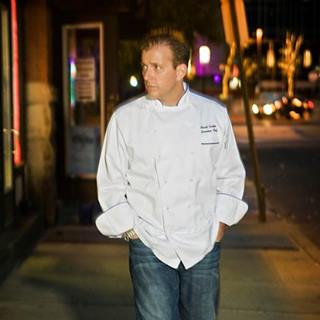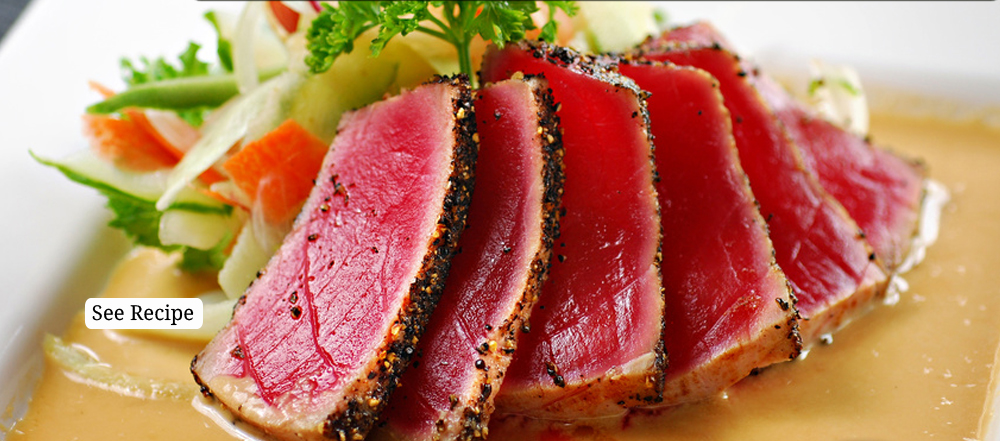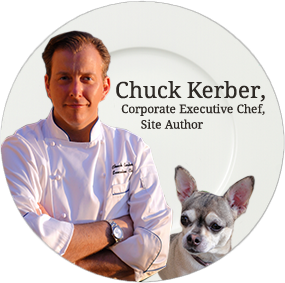
Chef Chuck Kerber
More Cooking Secrets
Never wash mushrooms! If the fungi have dirt or debris on them, simply brush it off with a cloth. Water will saturate the mushroom, leaving them tasteless and soggy.
Leave your butter out. You can actually leave butter out non-refrigerated for several days. Soft butter is easier to work with, and won’t tear your bread apart when you try to spread it.
Make sure your meat is room temperature before cooking. Cold meat seizes up, and can become tough. Also, make sure your meat sits for a few minutes after cooking- this enables the fats to solidify, producing a juicy, more flavorful piece or meat.
When making meatballs or meatloaf, add some water to the mixture- the end result will be a moist and delicious.
When making quick breads or cookies mix the dough just until it comes together. Overworked gluten will yield a gummy product.
Just because it reads Organic, doesn’t mean the nutritional content differs from a non-organic product.
Don’t buy pre-chopped garlic in water. The H2O dilutes the flavor of the garlic. Pure is always better.
Combine those bottles of left-over white and red wines to use for cooking later. Left-over wine? Where?
Always rinse your rice before cooking until the water runs clear. Clean rice, free of excess starch will come out fluffy, not clumpy.
For perfect hard-boiled eggs- start the eggs in a large pot with cold water and a tablespoon of salt. Slowly bring the water to a boil- cook for 8-10 minutes, then let sit for another 5 minutes. Cool the eggs in ice water, and store.
Place your fresh herbs in a wet-wrapped paper towel in the crisper. Or place them in a vase just like a bouquet of fresh flowers.
To keep your salt-shakers from clogging, throw a few kernels of uncooked rice in.
Pancakes are lighter and fluffier if you fold in a few whipped egg-whites.
If you’re looking for a tenderizing marinade, use something with a tomato base in it. The acid helps break down the fibers in the meat.
Always wash your poultry before cooking it- you can actually remove most of the harmful bacteria by doing this.
Season EVERYTHING you cook. TASTE everything before you serve it to you guests/customers.
Contrary to popular belief, the only way to tell if you have picked a good watermelon is by cutting it open and tasting it.
Just because your cheese has a little mold on it doesn’t mean it’s bad. Cut the mold off, and eat away!
Old honey will often crystallize and become solid. When this happens, put it in a warm water bath or microwave until the sugar crystals melt.
When clarifying butter, instead of skimming the milk solids off, do nothing at all. Eventually, the water and excess milk will evaporate leaving you with perfectly clarified butter.
Try using almond, or rice milk instead of soy. Increasing studies are showing that soy products can leach vitamins and minerals from your body.
Before settling on an olive oil, try as many as possible. Most good Italian stores will let you sample different oils… pick the variety that tastes best to you. Try using extra virgin when you can- this term means that the oil is made from the first pressing of the olives.
Don’t put oil in your pasta water- ever. Oil will prevent sauces from sticking to the noodles. And no, cold water doesn’t boil faster than hot water.
If you’re trying to cut calories when baking, try substituting apple sauce where you would use butter or oils.
Unbleached flour is better for you than regular processed flour.
Skim milk isn’t necessarily better than 1% or 2%. Your body needs the fat in order to metabolize the proteins. The same goes with eggs- a few yolks aren’t going to kill you.
Don’t add water or milk to your scrambled eggs or omelets- it dilutes the taste.
Lemon juice is an excellent preservative, and keeps food from discoloring.
Don’t trim all that fat from your meats before cooking- remember, fat=flavor.
Save your veggie trimmings in a plastic bag in the fridge- they’re great for soups, stocks and sauces.
If you put a small amount of butter or oil in your pancake/waffle batter, they won’t stick to the pan/waffle maker when they’re done.
Don’t use soap on your Teflon pans. A swipe with a damp paper towel is all it takes!
Sponges are havens for bacteria. If you choose to use a sponge, replace it every two days. Plastic dish brushes are cleaner. Clean your dish brushes in the dishwasher every time you run a cycle.
Chef Chuck Kerber
cooksandeats.com
chuck@cooksandeats.com











So many good tips, ALL usable in everyday cooking…
Thanks
Thanks Laura!
awesome tips! for new and old cooks! LOVE IT!
“If you put a small amount of butter or oil in your pancake/waffle batter, they won’t stick to the pan/waffle maker when they’re done.”
Just reminds me of the waffle maker they had at college… They always had spray oil, which if you put on liberally, the waffle wouldn’t usually stick. One day the chef said that they put butter in the batter so it won’t stick. I said, “Want to bet? If it sticks, you get to clean it?” She looked at me, nodded and spent the next 15 minutes cleaning the waffle maker.. I decided to have something else… Next morning, the spray oil was back. Myth busted.
Using butter in waffles in the mix just ads up to the flavor.
I agree 100%!
Hi,
Most of these are pretty standard knowledge. How about some real secrets from professional chefs? Like the reverse sear, marinating and brining, creating flavorful stocks and broths, making sausage, grinding fresh hamburgers or the big secret – where to get the best quality seafood (and I don’t mean from Whole Foods or a market). Those are the tricks of the trade that are kept close to the chest of most pro chefs.
Also, I was always told NOT to: “Always wash your poultry before cooking it- you can actually remove most of the harmful bacteria by doing this.” because it just will spread bacteria around can contaminate the sink or surfaces. Cooking will kill all the bacteria and it’s best to handle poultry as little as possible in my book.
Thanks and happy holidays. -Jon
Thanks a lot sir. This will make me look a lot smarter at m cooking job!
Love the idears, I love to cook so much fun creating new things, these tips are great, Thankyou.
I stopped reading after the first “tip” because it was completely false. Take a look…It’s in a book…READING RAINBOW!!!
“The Mushroom Bureau advises that all you need to do is give the mushrooms a wipe with a damp cloth or a quick rinse. It’s true that they will absorb water and the more water is absorbed the lower the flavour. This is because they are neither a fruit nor a vegetable so do not have an outer skin like an apple for example, and, as a result, will absorb water. You should never soak, peel or remove the stalk.”
Mushrooms should NEVER be washed- I’ve never worked with a chef that washed his/mushrooms- it just doesn’t happen. I know there are contradicting views on this subject, but true professionals don’t do it- soggy mushrooms don’t caramelize. I guess we will have to agree to disagree on this one.
Thanks for reading!
These tips are right on. I particularly liked the ‘Don’t add water or milk to your scrambled eggs or omelets- it dilutes the taste.’ This is one that has always bothered me.
However, I have actually tested the rinsed mushrooms versus the brushed mushrooms several times and found no difference in taste or ability to caramelize. The fact that fresh mushrooms contain a great deal of moisture and need to be cooked past this means that the small amount of water left from rinsing them off is negligible. Maybe, if they were soaked, they would become saturated but I have found that a quick rinse does them no harm.
Thanks for the post. I hate to disagree with an expert but I couldn’t help it.
Thanks for the comment- no worries about disagreeing with me, I appreciate you reading!
Great article! Thank you for sharing all of these great tips!
You are very welcome sir!
sAME YOU SAID ABOUT WATERMELONS GOES FOR AVOCADOS
Avocado. If it feels over-ripe, break the nub from the stem off. If it looks green rather than brown beneath the stem nub, it’s still good!
Excellent tip!!!!!!!
americas test kitchen says rinsing chicken isnt really necessary. what gives?!
Opinions vary- I believe it is an effective way to cut down on bacteria. Regretfully, there are no conclusive answers.
Hi Chef,
One of your tips said “Try using almond, or rice milk instead of soy. Increasing studies are showing that soy products can leach vitamins and minerals from your body.” I’ve tried looking this up but can’t seem to find any such studies… I’m not disagreeing with you, but I feel like I’m missing something.
There’s also a lot of different kinds of ‘milks’ out there that can be used in place of soy or cow’s milk- hemp milk, which I personally think tastes closest to cows milk; hazelnut milk, cashew milk, and even mixed nut milks. If someone is allergic to soy or nuts, hemp milk is a seed-milk and doesn’t cause a reaction. Plus these milks can give lots of different kinds of vitamins and minerals to your body! It’s important to branch out and try everything!
nice of you Chef Chuck
Good tips but there is an exception with rice; I never rince arborio if I’m making risotto because the starch is what makes it creamy!
Wow, what a collection of suggestions. I’m always cooking rice. Gotta try rinsing it more to get it nice and fluffy. Thanks for the advice!
http://www.forkstofeet.com
No science support the mushroom thing or the oil in pasta water thing or the water / milk to eggs thing. Otherwise, glad to hear common sense rule!.
First, I have never worked with a chef that washed his/her mushrooms- it’s just not done by the pros- never has been. Water gets absorbed in the mushrooms if they’re washed- that’s a fact. Chefs would much rather have their fungi come in contact with butter, oils, or some other flavoring ingredient first. Second- oil should never be put in pasta water- it keeps the sauce (or any other flavoring agent) from adhering properly to the noodles. Once again, I’ve never worked with a cook that put oil in pasta water. Third- milk or water shouldn’t be put eggs because it compromises the purity (and dilutes) the product- something professionals know NOT to do. Sorry to break to truth to you 🙂 Thanks for reading!
Chef Chuck
Chef Chuck,
Thank you for sharing these tips! I only cook for my husband and our daughter, but I love cooking and finding tips and tricks to help me out. I always tend to forget to let the meat sit at room temperature because i’ve always heard that’s when bacteria grows….I am going to make a point when cooking my steaks to not go from the fridge to the pan/grill.
Thank you!!!
Thank you! I really appreciate you taking the time to read my tips. I’m launching a new site in the next few weeks, I hope you continue to visit!
Chef Chuck
Im also guilty of putting oil in the water and then on the noodles after they’ve been drained…..
I learn something new everyday. 🙂
Thank you for taking the time to read my comment and respond! I will definitely keep checking back. I’ve got this page bookmarked on my laptop and phone. Do you have any good southern food recipes that you can share? 🙂
Roxane
Sure do- go to the search box and type in “fried chicken!”
I think you can wash mushrooms – I wash the tops (not the gills); the gills hold so much of the flavour of a mushroom.
I’m sure mushrooms have been rained-on in the wild.
mushrooms should be wiped clean (in my opinion) and not washed with water- thank you very much for reading!